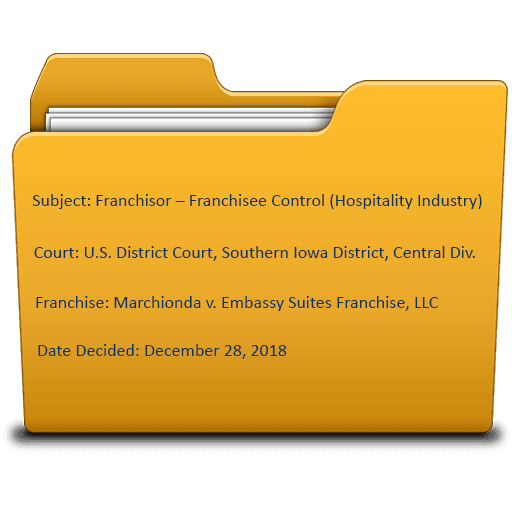
A hotel patron was sexually assaulted in her room. The assailant, another registered guest, obtained the room key from the front desk manager during the night, whom assumed the assailant had lost his room key and was requesting a replacement. The assailant then obtained assistance from a custodian to open the door’s safety latch while the plaintiff was asleep. Assailant was known by hotel staff as a regular guest, an excessive drinker, and also known to pursue women in the hotel bar.
The plaintiff sued the Franchisor, Embassy Suites Franchise, LLC, Hilton Worldwide Holdings, Inc., and Hilton Worldwide, Inc. (“Hilton”); the Franchisee, Atrium TRS III, LP; and the Franchisee’s management company, Hammons.
The Court (on a summary judgment motion) found that “the Franchisee, not the Franchisor, retained control over the daily operations of the business, as evinced by the fact that the franchisee owned the business equipment, operated the business, held the licenses and permits, set employee wages, provided training for its employees, provided insurance for employees, and made the employment decisions. Hilton did not have the requisite day—to—day control to render it a possessor of land, and therefore did not owe Marchionda a special duty of care.”
Marchionda argued that the management company, Hammons, and its employees were apparent or ostensible agents of Hilton, and therefore Hilton was liable under an agency theory. The Court found that the hotel Franchisor — Franchisee relationship in the present case did not create the inference of an agency relationship, and Franchisee did not hold itself out to be an agent of Hilton.
Marchionda also argued Hilton could be held liable for failure to train and supervise Hammons’ employees, but because no agency or employment relationship existed, the Court rejected the Plaintiff’s train/supervise theory.
Although the Court ruled that the Franchisor lacked the requisite control over security of the hotel in question, it found that the security issues were assumed duties of the Franchisee under the Franchise Agreement.
The relationship between Franchisee and Plaintiff was that of innkeeper and guest. The Court observed that the duty that arises out of that relationship “does not make the [innkeeper] an insurer.” However, the Court found that the evidence was sufficient to defeat the Franchisee’s motion for summary judgment: “…the fact that a room key was given by a Hotel employee to an obviously intoxicated Hotel guest without requiring any identification, followed minutes later by assisting the same guest in disabling the guest room’s safety latch, again without asking the guest for identification, clearly generates a genuine issue of fact on foreseeability that harm would come to Marchionda as a result.”
The Court permitted the Plaintiff’s claim for punitive damages to survive the motion, as well.
Citation: 2018 U.S. Dist. LEXIS 221725
BE ADVISED that these comments are not intended as legal opinions and are not to be relied upon as legal advice. If you need franchise-related legal advice, please contact us to discuss the specifics of your franchise business.
© KilcommonsLaw, P.C. 2019
